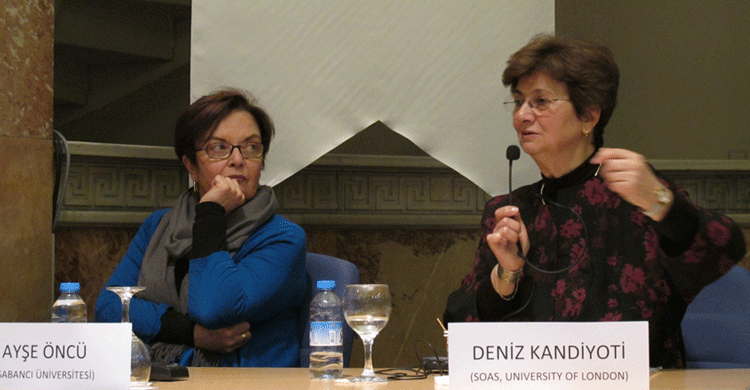11/03/2015
Deniz Kandiyoti: “We live in times when women’s rights are in the line of fire”
Sabancı University Gender and Women's Studies Forum invited Deniz Kandiyoti for a lecture as part of the International Women's Day events.

Sabancı University Gender and Women's Studies Forum invited SOAS, University of London faculty member Deniz Kandiyoti for a lecture on Saturday, March 7, 2015 at the Karaköy Minerva Palas to remember the International Women's Day.
Deniz Kandiyoti gave a lecture titled “Dead End for Women's Rights?" in a session moderated by Sabancı University Faculty of Arts and Social Sciences member Ayşe Öncü.
Kandiyoti began by discussing the history of the International Women's Day. Kandiyoti commented that the failure of the United Nations to adopt a resolution for holding the 5th Global Women's Conference, which has been held every ten years since 1975, in 2015 was a dismal situation.
Kadın hareketlerinin tarih ve mekanla bağlantılı olduğunu söyleyen Deniz Kandiyoti, kadın hareketlerinin küresel etkenlere ve jeopolitik hareketlere maruz kaldığını ifade etti ve kadın haklarının ateş hattına sürüldüğü bir dönemden geçtiğimizi belirtti.
Deniz Kandiyoti explained that women's movements are vulnerable to global factors and geopolitical shifts, and that we were living in times when women's rights are in the line of fire.
Kandiyoti said that while countries like Saudi Arabia only use women's rights to make an impression on a global level, women in Turkey were still struggling to be recognized as humans in the 21st century.
Deniz Kandiyoti drew attention to the connection between imperialism and feminism, and criticized so-called "project feminism." Kandiyoti said, “Project feminism condemns women's empowerment to market shares, and brought women on higher levels to those on lower levels, instead of the opposite."
Deniz Kandiyoti also mentioned the murder of Özgecan Aslan and its reverberations in the society. Kandiyoti said that the reactions were the clash of differing consciences, and emphasized that men who wore skirts to protest were a world apart from men who believe they own women.
Deniz Kandiyoti argued that feminism began as a political movement for liberation, expressing her concern that women's movement falling victim to populist policies and her discomfort with women's rights being used as a hollow indicator of development.
Finally, Deniz Kandiyoti said that men can also be feminists like women can, and explained that this was a political movement. Kandiyoti then took questions from the floor.
About Deniz Kandiyoti
Deniz Kandiyoti is an author and an academic of research in the fields of gender relations and developmental politics in the Middle East, specifically Turkey. She holds a PhD from London School of Economics.
Her work on gender and Islam, especially in post-colonial and rural development areas, has been influential throughout the entire field. She has pioneered new research into understanding the implications of Islam and state policy on women, and as a result has brought more attention to the field.
As of 2010, Kandiyoti is Emeritus Professor in Development Studies at the School of Oriental and African Studies,part of the University of London, where she began working in 1992. She has done consultancy work for United Nations Development Programme (UNDP), International Labor Organization (ILO), United Nations Environmental, Scientific and Cultural Organization (UNESCO) Organization for Security and Co-operation in Europe (OSCE), the UK's Department for International Development (DFID) and the United Nations Development Fund for Women (UNIFEM).
Last year, Kandiyoti received the Jury Special Award in the Sakıp Sabancı International Research Awards.





